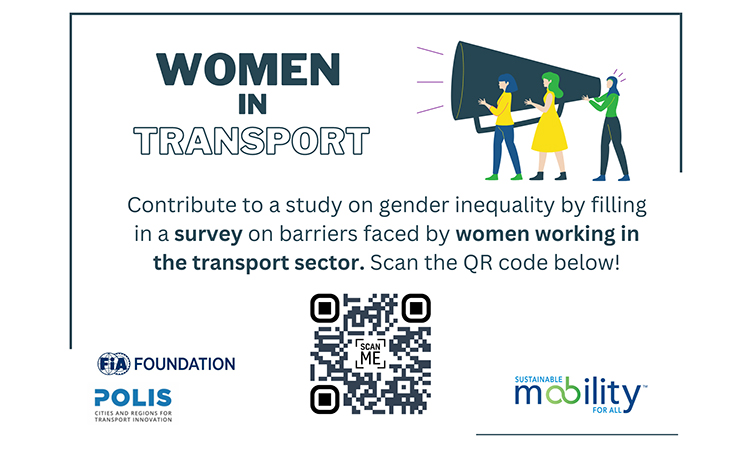Mobilising momentum to improve transport’s gender diversity
- Like
- Digg
- Del
- Tumblr
- VKontakte
- Buffer
- Love This
- Odnoklassniki
- Meneame
- Blogger
- Amazon
- Yahoo Mail
- Gmail
- AOL
- Newsvine
- HackerNews
- Evernote
- MySpace
- Mail.ru
- Viadeo
- Line
- Comments
- Yummly
- SMS
- Viber
- Telegram
- Subscribe
- Skype
- Facebook Messenger
- Kakao
- LiveJournal
- Yammer
- Edgar
- Fintel
- Mix
- Instapaper
- Copy Link
Posted: 23 November 2022 | Isobel Duxfield - POLIS Network | No comments yet
POLIS Network’s Isobel Duxfield shares her thoughts on the gender imbalance within the transport industry, and provides exclusive insight into the SUM4All project, which is working to produce a practical guide to and toolkit for the essential changes which need to be made to secure greater female participation in the sector.


The transport sector currently finds itself at a critical juncture. Staff shortages, new digital requirements and an impending climate crisis are stretching the current system to breaking point – and, behind all of this, the lack of gender diversity is taking its toll.
Women account for just 22 per cent of Europe’s transport workforce. This is just an average – figures dip below 15 per cent in the bus sector and below five per cent of pilots. When you consider that women make up 47 per cent of the UK workforce, these figures are staggering – if not shocking.
Lack of gender diversity has long-lasting effects in how we think, plan and design our transport systems”
“Lack of gender diversity has long-lasting effects in how we think, plan and design our transport systems,” said Mailys Garden, Associate at Momentum Transport Consultancy, and member of Women in Transport, a not-for-profit which supports women in the sector and promotes a more diverse transport workforce.
Let’s be clear, women’s under representation in the transport sector is no secret. Networks across the world – from Women in Transport in the UK, to Mujeres en Movimiento in South America, to the Flone Initiative in Africa, to the Pacific Women in Maritime Association, I could go on – have been campaigning for equality and supporting women in the transport sector for many years.
At the same time, international bodies – including the International Transport Workers’ Federation (ITF) and International Association for Public Transport (UITP), the World Bank and the FIA Foundation – have long led calls for change, warning that current education opportunities, recruitment practices, workplace cultures and career development opportunities for women and girls will not prompt the radical reforms required to close the persisting gender gap.
Supporting women’s employment is more urgent than ever.


The toll of gender imbalance
Transport’s gender diversity problem is part of a wider question of women’s employment opportunities worldwide.
In October 2022, the European Institute for Gender Equality (EIGE) and UN Women both released their latest figures on gender equality, and both made for grim reading. There has been a mere 0.6-point increase since 2021’s edition, and women’s employment status and associated financial independence are dragging scores down significantly.
Transport’s gender diversity problem is part of a wider question of women’s employment opportunities worldwide”
The pandemic had devastating impacts on gender equal employment, with women’s labour force participation dropping, leaving five million fewer employed in 2022 compared to 2019.
At the same time, national and international legislation still lags far behind what it should be. It is true that we are seeing increased protections for women, such as the UK Equality Act, new EU directives and ILO conventions; yet, currently, more than 2.7 billion women around the world are legally barred from having the same career opportunities as men, and the latest United Nations (UN) figures warn that improvements have been far too slow.
Seventy-six countries do not legislate paternity leave and, astoundingly, 42 do not prohibit the dismissal of pregnant women – a figure that, believe it or not, has risen in the last year.


For the transport sector, many legal barriers are devastating, as restrictions on women’s employment rights for driving and night-time work, for example, are stalling progress.
Beyond the obvious human rights issue, diversity pays. According to figures from the EIGE, if gender equality is substantially improved, by 2050, the European Union (EU) employment rate will reach almost 80 per cent, compared to 76 per cent in the absence of such improvements – leading to an increase in gross domestic product (GDP) of about 12 per cent.
Transport cannot afford to squander this opportunity.
The sector takes action
It is not all doom and gloom; there is reason to celebrate. We are seeing rapidly growing awareness, political will and industry action to support recruitment, retention and training opportunities.
We are seeing rapidly growing awareness, political will and industry action to support recruitment, retention and training opportunities”
“Whilst transport has traditionally been a male dominated sector, increasing numbers of women are contributing to the all-important job of delivering transport services, and it is great to see an increasing focus on encouraging a diversity of talent within the transport sector,” says Elizabeth Box, Research Director at the RAC Foundation.
Bus and rail operators including First Bus, Transdev and the Go-Ahead Group are conducting female-only recruitment events; meanwhile initiatives like ‘Women moving the city’ in Accra, Programa Mujeres Conductoras in South America and Mexico reflect the global nature of this drive.
The ride-hailing sector is also investing in redressing its current gender balance. Just last month (October 2022), Uber earmarked one million Euros for various initiatives to tackle barriers such as workplace harassment and restrictions on driving licenses.
“This funding is going towards introducing and scaling up actions such as subsidising PHV licences, forums for women drivers and piloting products which allow women drivers to indicate a preference for picking up women rider,” said Zuzana Púčiková, Uber’s Director of EU policy.
However, action begins beyond the workplace, with the expansion of education and training opportunities for women and girls.
Action begins beyond the workplace, with the expansion of education and training opportunities for women and girls”
In the UK, women account for just 16 per cent of engineering and technology graduates, thus limiting their access, preparation and opportunities to enter key mobility fields. While this figure has risen (marginally) over the last few years, women and girls are still (according to the latest UN report) “systematically tracked away from science and math”.
The result is clear in our workforce, with women making up a mere 24 per cent of UK science, technology, engineering and mathematics (STEM) professionals. For transport, this shortage is particularly acute, with Women in Trucking’s (WiT) latest Index revealing that 94 per cent of the transportation companies that were surveyed held no women in technician roles.
Many operators are taking active steps. For example, Women in Wheels NI’s apprenticeship ambassador programme, EMT Madrid and Comillas University’s joint STEM chair for women and Women in Motion (WIM) by Ferrovie Dello Stato Italiane, the Italian railway company, are raising awareness, providing mentoring and championing apprenticeship opportunities.


At the same time, retention is also a challenge. Here, improved maternity provision will be essential for preventing the career interruption that we are seeing. Today, in Europe, a staggering 40 per cent of women (compared to 21 per cent of men) still spend at least four hours per weekday caring for young children, and the inability to balance domestic and professional responsibilities is forcing many women to abandon their careers early.
While most European governments legislate maternity leave, transformative change requires the transport sector to go above and beyond and provide further flexibility and job security.
Transformative change requires the transport sector to go above and beyond and provide further flexibility and job security”
For example, MAERSK’s ‘Return to Work’ programme exceeds Danish legislation on parental leave to offer a full 24 weeks, while the ‘Worklife mamma’ training offered by the Ferrovie dello Stato Italiane Group supports mothers and their managers in developing a clear dialogue with managerial staff and new mothers to smooth their transition back to work, while fighting gendered stereotypes.
Then there is career progression; the higher you go, the fewer women you find, and there is an appalling lack of women occupying top positions in transport in both the public and private sectors.
Women make up just 15.5 per cent of ministers with transport portfolios across the 27 EU Member States; meanwhile, in the automotive sector, the number of women in the highest-paying transport jobs averages around 20 per cent – with WiT’s 2022 Index showing that one in five have no females on their boards.
“Both the West Midlands Combined Authority (WMCA) and the Urban Transport Group are looking to address our current gender gap, by having female leaders and speaking at events about why it is such a great industry for women to work in,” said Laura Shoaf, Chief Executive of the West Midlands Combined Authority (WMCA).


“Personally, I always speak about transport as part of what makes urban areas work, that getting it right is social justice and key to improving the lives of women,” she added.
Initiatives like the Ambassadors for Diversity in Transport Network, MobilityXX in the U.S. and Women in Transport’s Advance mentoring programme in the UK are urging organisations to diversify their leadership while providing networking and mentoring opportunities.
“Efforts like MobilityXX are crucial to advancing women in the industry because it requires commitment to tangible actions that will help us attract, promote and retain women and other voices that have long been excluded or undervalued,” says the Intelligent Transportation Society of America’s (ITS America) President and CEO, Laura Chace – a founding member of the MobilityXX initiative.
Mobilising momentum!
We now need to capitalise on these initiatives to accelerate and expand action.
“It is great to see an increasing focus on encouraging gender diversity within the transport sector, but this now needs to be sustained and grown overtime,” warned Box.
According to Women in Transport’s 2021 survey, 70 per cent of women reported discriminatory behaviour or language, and felt the industry still had an image problem.
“More needs – and can – be done by organisations and governments to improve,” Garden asserted.
More needs – and can – be done by organisations and governments to improve”
This is what the Sustainable Mobility for All Gender Working Group’s (SUM4All) latest initiative seeks to achieve.
The project – being led by POLIS, a European network of cities and regions working towards sustainable mobility, with support from Heather Allen, an independent consultant with more than 25 years international experience in gender, transport, sustainable development and climate change, and with funding from the FIA Foundation – will produce a practical guide to and toolkit for the essential changes which need to be made to secure greater female participation in the sector, based on good practice examples from across the globe.
“FIA Foundation is delighted to be supporting this work. Supporting women who are frequently in the minority as workers in the transport sector, is a vital aspect in ensuring a gender-balanced approach to sustainable mobility,” said Sheila Watson, the Foundation’s Deputy Director.
It will form a very practical support tool for national and regional policymakers, private sector stakeholders, regulators and other key planners and decision-makers in the field.
Undoubtedly, we cannot paint all sections of the industry with the same brush, as each faces unique gender equality challenges. Indeed, issues around maritime shift patterns differ from the challenges that public transport operators face in recruiting female drivers, which in turn diverge from the lack of female technicians in the automotive sector.
Nevertheless, there is much that we can learn from one another.
Gender imbalance in the sector starts with recruitment and continues into employment, yet the data that we have does not allow us to understand the challenges that women face or to see where policies and initiatives could make a difference”
“Gender imbalance in the sector starts with recruitment and continues into employment, yet the data that we have does not allow us to understand the challenges that women face or to see where policies and initiatives could make a difference,” asserts Heather Allen. “This study looks to give us greater insights into where there has been change and what still needs to be done.”
At the same time, we cannot overlook the importance of regulatory and legal change, a factor that the SUM4All guidance also seeks to examine.
Shifts in maternity leave regulations, legislation preventing workplace harassment and even menopause policy (a less discussed, but equally critical, part of women’s professional experiences) must be improved.
Capturing and harnessing all of these moving parts is a complex, yet critical, task if the sector is to secure the innovative thinking and sheer (wo)manpower required to overcome the enormous challenges that are ahead in establishing the smart and sustainable mobility services that are required.
“It is vital that we increase our numbers across all levels, including at the decision-making levels, we must now mobilise momentum,” asserted Chace.
Actions like SUM4All’s toolkit, which builds on the fantastic positive action out there, will be key in linking legislative frameworks and sectoral initiatives to show how they can work in tandem to achieve gender equality in the transport sector.
Want to support the project?
If you would like to support the project, you can complete the short survey, which addresses the current gender balance in your organisation and the ways that you are creating a more gender-equal workforce. You may also indicate if you have further examples or initiatives that you wish to bring to our attention at the end, and we can take up direct contact with you.




Related topics
Public Transport, Staff & Skills Development, Transport Governance & Policy, Workforce Inclusivity, Workplace
Related organisations
Ambassadors for Diversity in Transport Network, Comillas University, Empresa Municipal de Transportes de Madrid (EMT Madrid), European Institute for Gender Equality (EIGE), European Union (EU), Ferrovie dello Stato Italiane Group, FIA Foundation, First Bus, Flone Initiative, Go-Ahead Group, Intelligent Transportation Society of America (ITS America), International Association for Public Transport (UITP), International Transport Workers' Federation (ITF), MAERSK, Momentum Transport Consultancy, Mujeres en Movimiento, Pacific Women in Maritime Association, Polis, RAC Foundation, Transdev, Uber, UN Women, United Nations (UN), West Midlands Combined Authority (WMCA), Women in Motion (WIM), Women in Transport, Women in Trucking (WiT), Women in Wheels NI
Related people
Elizabeth Box, Heather Allen, Isobel Duxfield, Laura Chace, Laura Shoaf, Mailys Garden, Sheila Watson, Zuzana Púčiková







